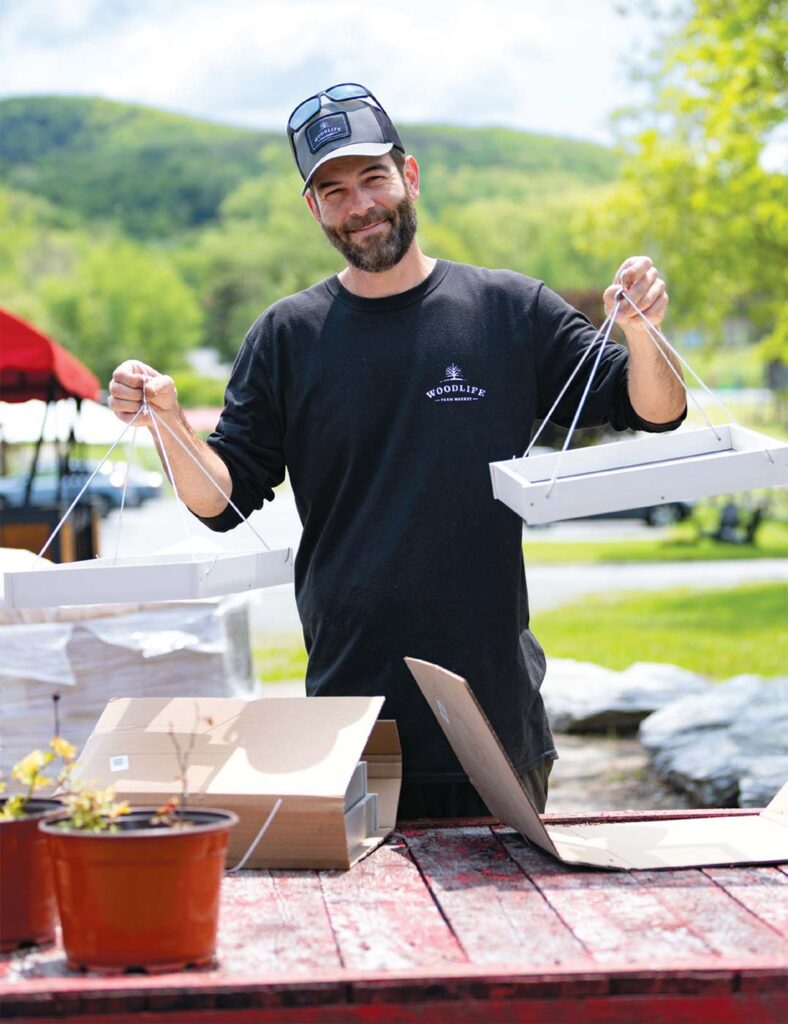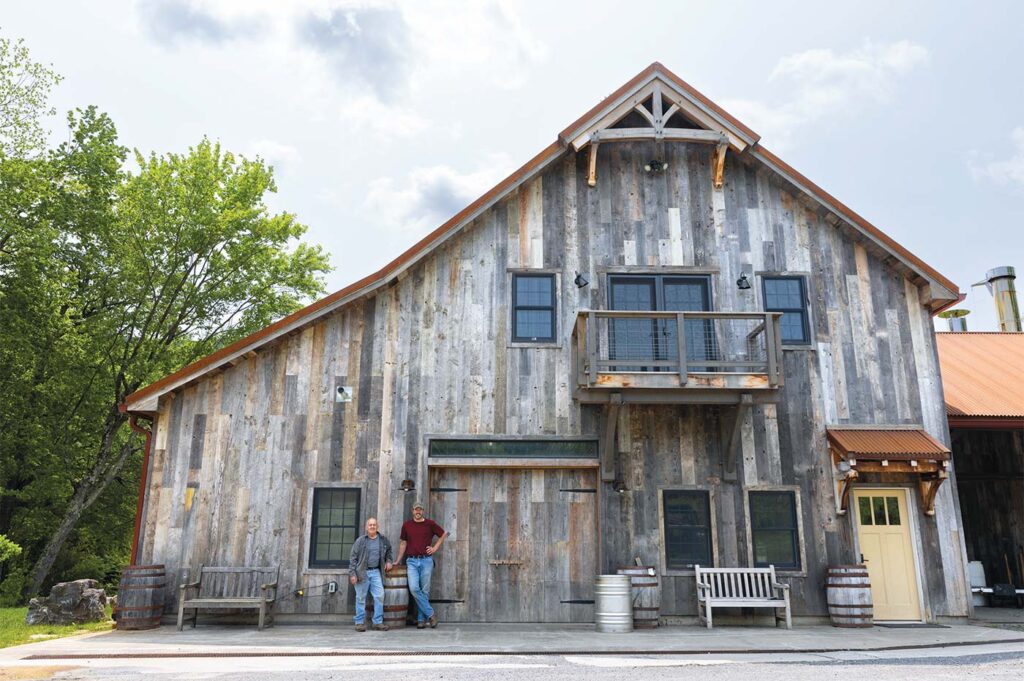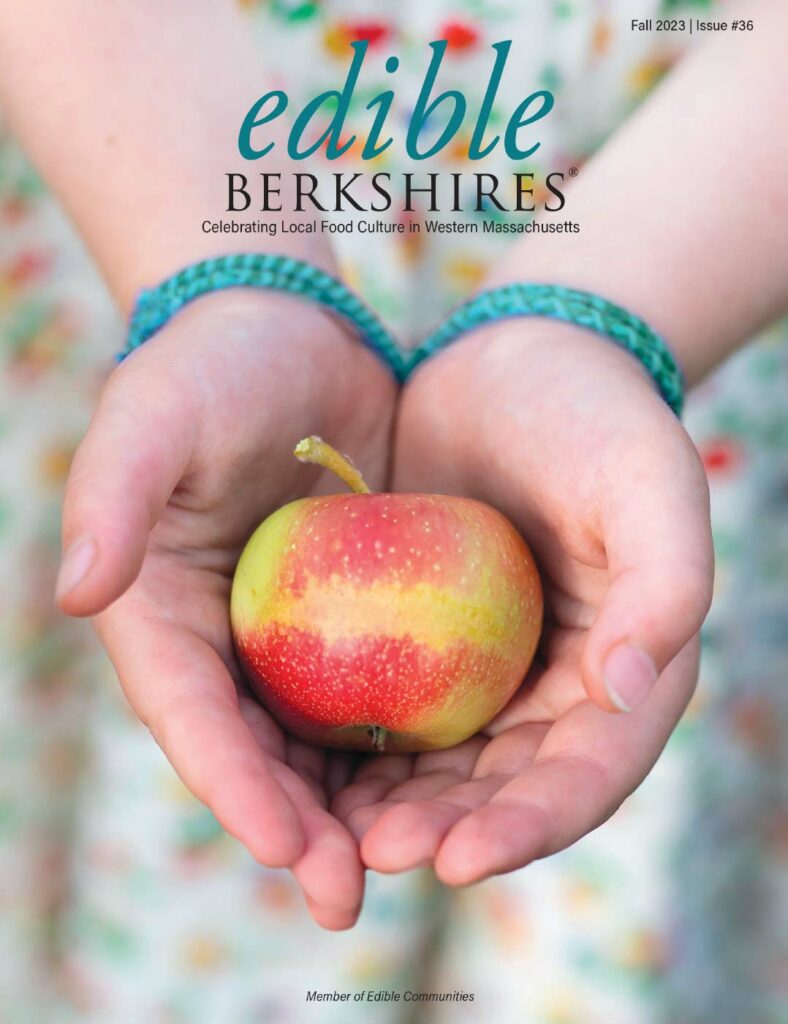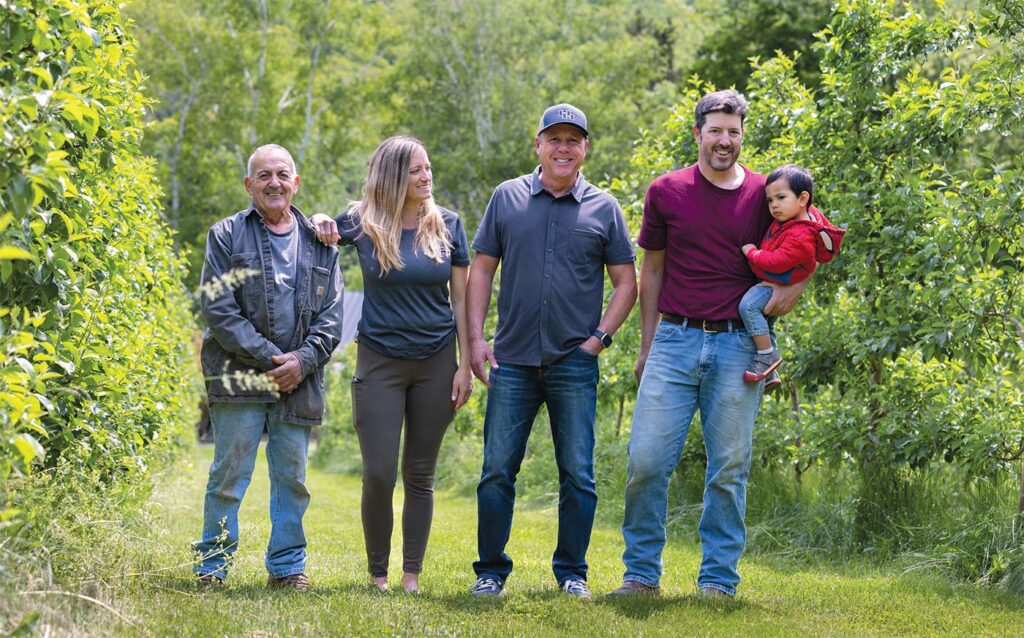
PHOTOGRAPHS BY CHRISTINA RAHR LANE
Mike Patten sits behind the wheel of his side-by-side utility vehicle, navigating his way across the streams and up the wooded trails that cut through his 1,100-acre Woodlife Ranch. With his favorite Labrador, Newt, by his side, he explains that we’re seeing just a fraction of the property, which is on the border of Hancock and South Williamstown. It is home not only to his sprawling post-and-beam timber-frame ranch, but to a little sawmill, 10 beehives, 1,000 espalier apple trees, berry bushes, and a maple- sugaring operation. It’s an impressive tract of land, and one that he has spent decades expanding and cultivating. He’s a longtime real estate developer but, he says, “some land is meant to be developed, and some is not.” Clearly, Woodlife falls into the latter category.
Patten bought his first 60 acres in Williamstown in the early ’90s and took an existing structure on the property down to the frame to reveal the bones of an old barn. From there, he began renovating and expanding the house, using timber from the land, and creating a home with the vibe of a classic hunting lodge. “Whenever [more land] became available and I could connect the dots, I’d buy it and add it,” he says. Initially, there was just a family garden, some apple trees, and a mountainside that Patten managed for timber.
Along the way, he let the land inform the choices he made. “We have all this beautiful maple and I didn’t want to cut that,” he says. “We decided to make maple syrup and we built the sugarhouse.” With help from Ioka Valley Farm, just down the road, Patten set up his maple-sugaring operation. “In most places, people would say ‘oh, you’re competing with us,” he says. “But that’s not how it is here.” Thanks in part to the Leab family at Ioka, Patten now has his own maple business and produces 1,200 gallons of syrup a year. Over time, he added blueberries, raspberries, peaches, and beehives. “We could never leave here and eat entirely from the land,” he says. An avid fisherman and hunter, Patten’s home is filled with mounted game trophies—elk, deer, turkey—most of which were on his dinner plate at some point.
“The fun thing is that it’s really up to us what we grow. We take input from the public and I will take recommendations from local restaurants if they want a specific crop.” —Kate Malloy, farm manager
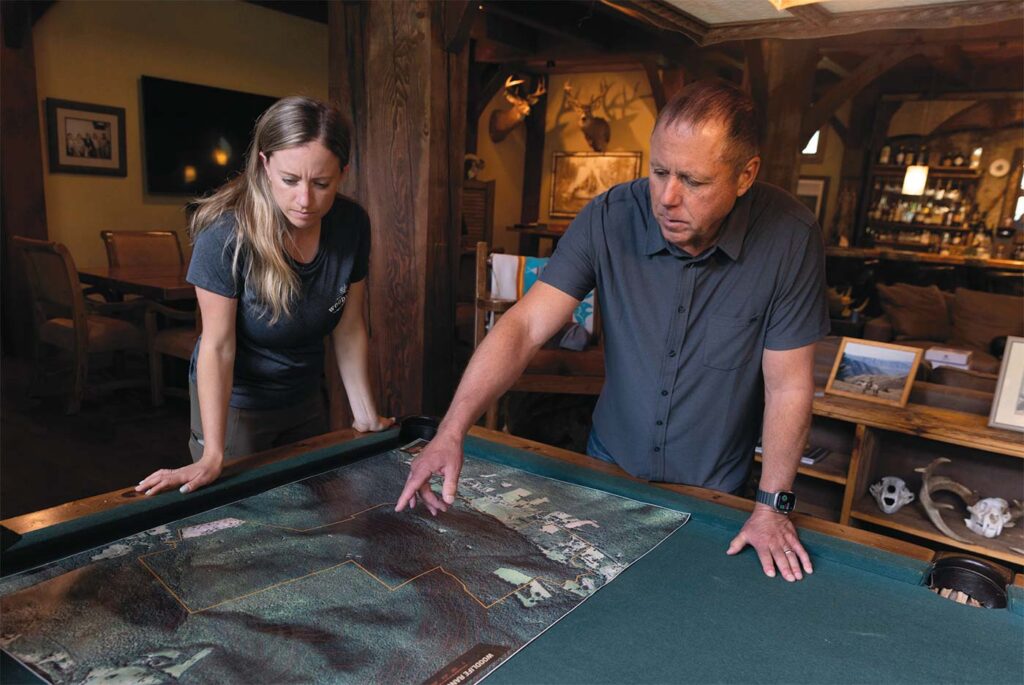
GROWING VIA RETAIL
Were it not for Covid, we may still not know much about Woodlife Ranch, which has never been open to the public and is tucked away inconspicuously off Hancock Road. Prior to Covid, Patten had his eye on the 150-acre Windswept Farm in nearby New Lebanon, New York, but could not come to a purchase agreement with farmer John Senger, who was locally known for his very tasty sweet corn and stunning gladiolus. When Senger passed away in 2020, Patten was able to negotiate a sale with the family. He saw huge potential in the property, which then contained a large barn that was open seasonally and housed produce, flowers, and an odd assortment of antiques and bric-a-brac.
During Covid, Patten recalls, “I said, I’m not going to ever wait in line with a mask in a grocery store to buy a steak or a chicken. People want to be outside and they want to be spread out.” And so, his vision for the newly acquired New Lebanon property evolved: He got to work converting the barn into what is now Woodlife Farm Market. “We used to operate out of the garage, selling canned goods and our own fresh produce,” says Patten’s stepdaughter, Emily Gamble, who manages the New Lebanon property. “We kept adding more and more every year, hoping that it would take off at some point.”
The newly renovated market officially opened in July of 2023 as a specialty grocery store that sells produce from the ranch and farm, high-quality meat and fish, ice cream, and a variety of locally sourced products. While revenue has been growing steadily, Patten says, “We’ll lose money on it for a while, but right now, it’s important to have the right staff so that everyone has a great experience.”
As a successful real estate developer (working mostly in Texas), Patten knows a thing or two about delegating. He put Gamble in charge of managing the store, which she does with Susie Ausman as her retail manager. He recruited chef Peter Belmonte, previously executive chef at the Williams Inn, as culinary director and executive chef. Whether it’s smoking his own pastramis and beef ribs, bringing in the freshest fish from Boston, or beef from Chicago, Belmonte says he’s “making sure I’m sourcing a better product than you can get in other places.” He notes that last year, Woodlife sold “well over $100,000 worth of sandwiches.”
Kate Malloy started working up the road at the ranch, growing flowers and pruning trees, then moved to New Lebanon as farm manager. She’s planted approximately 950 apple trees over the past three years and oversees tending John Senger’s gladiolus corms. “There have got to be over 1,000 of them,” says Malloy. “And we’ve got to dig them up every year and replant them in the spring.” Malloy loves experimenting with growing vegetables. This year, she’s growing potatoes in hay bales to better manage pests and disease. “The fun thing is that it’s really up to us what we grow,” she says. “We take input from the public and I will take recommendations from local restaurants if they want a specific crop.”
At the ranch, Patten’s childhood friend Nate Finney manages the forests and the roads, Emily’s grandfather, Rudy Gagliardi (“Pops”), a welder by trade, can fix just about anything, and his son, Mario, manages the maple syrup operation and all the planting. In all, 15 or so employees keep both the ranch and the farm humming along.
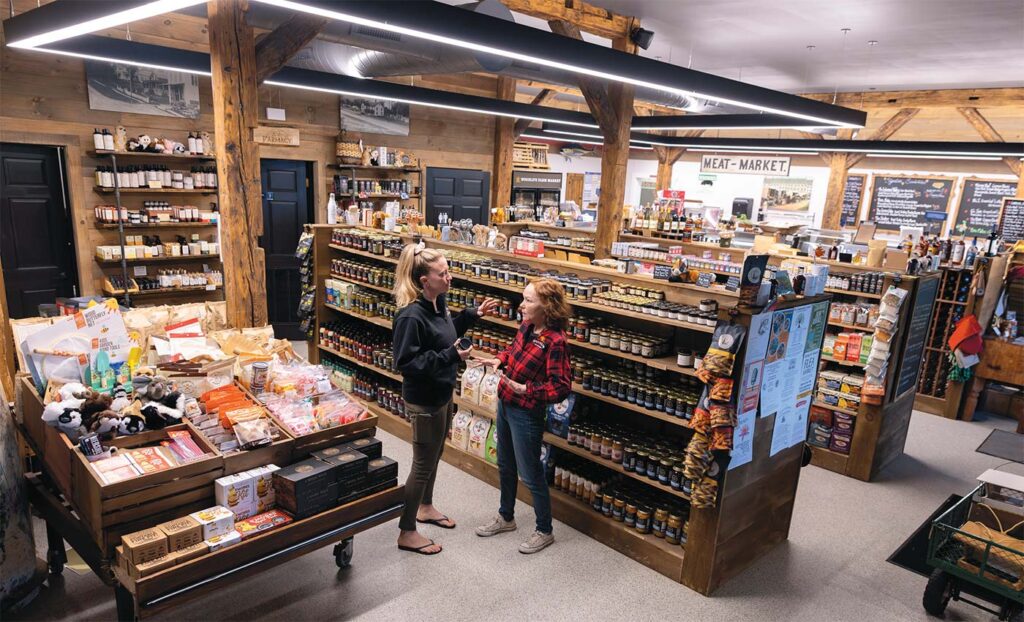
BUILDING COMMUNITY
For Patten and his team, the Woodlife Farm Market experience is about more than just shopping: From the outset, the goal was to create a community hub at the farm. There’s a playground on the property, and a pond stocked with bass and trout that will host catchand- release fishing derbies for kids this summer. “On Saturdays and Sundays, we do breakfasts,” says Gamble. “We have planting classes, a lobster fest with live music, and this year we have two car shows.” In the future, there will be “pick your own” opportunities with strawberries, blueberries, raspberries, peaches, and apples. And the farm’s two greenhouses, filled with flats of colorful annuals and hanging baskets in the summer, are stocked with precut evergreens during the holiday season. Patrons can also cut their own trees on the property.
“We’ve had small weddings there and would like to do more weddings on the hill,” says Patten. “And we might build some small homes or offer glamping because it’s much easier to book weddings if you have places for people to stay.” He notes that Woodlife’s trails lead into the 11,000-acre Pittsfield State Forest and that he plans to promote the property as a hub for mountain biking, hiking, and horseback riding. The community vibe extends to the farm market itself, where customers can cozy up on a welcoming leather sofa facing a massive stone fireplace. The shelves are stocked with a large variety of locally made specialty food items, wines, and spirits, plus Woodlife branded products—honey and maple syrup that are processed, packed, and labeled at the ranch, plus apple cider, salsas, pickles, sauces, jams, and other items that are co-packed in West Virginia, and by Beth’s Farm Kitchen in nearby Old Chatham, New York. “We like to keep it as local as we can,” says Gamble, who, at 32, envisions a long-term career at Woodlife.
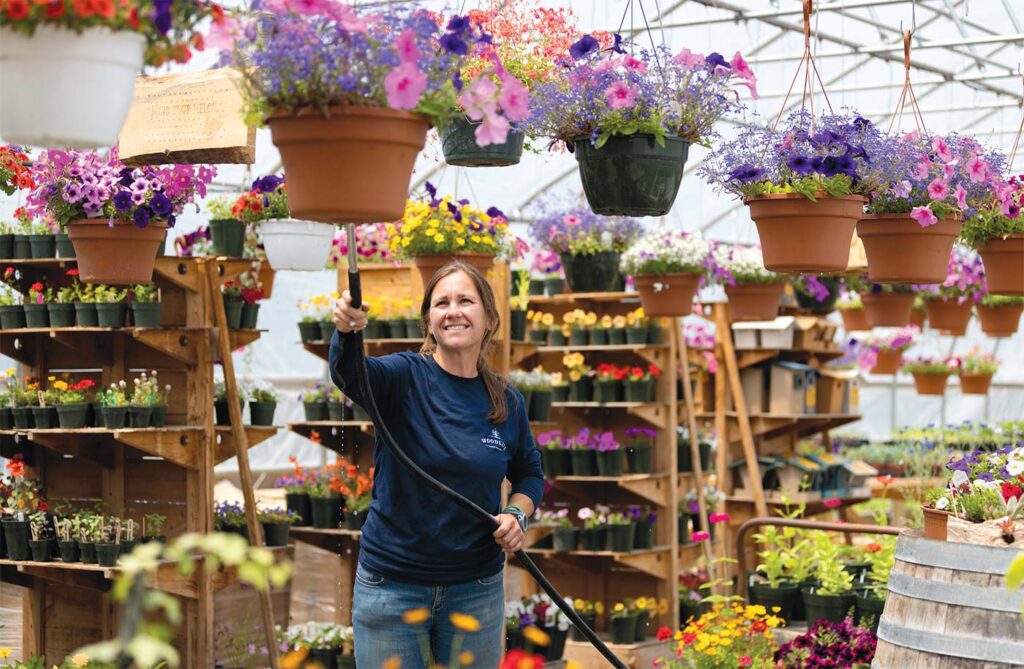
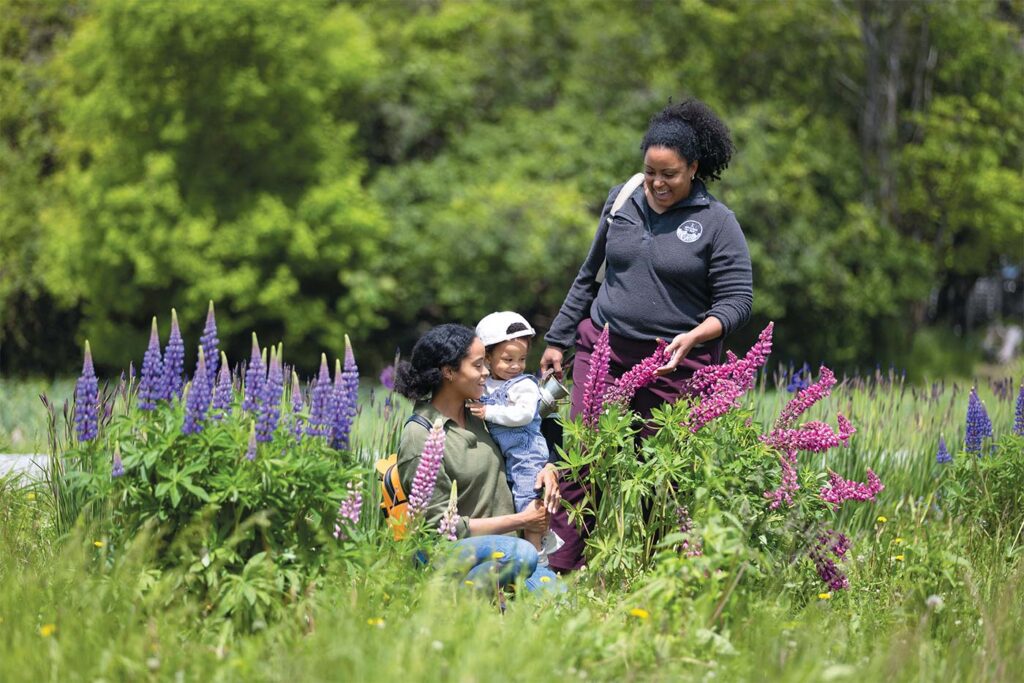
DEEP ROOTS
It’s Gamble, in fact, who is the public face of the Woodlife brand. Patten travels back and forth between the Berkshires and Naples, Florida, where his wife’s teen children are in school. His real estate business, run by his son, John, is based largely in Texas. Gamble, who grew up on the ranch in Williamstown, ventured to Colorado and California in her twenties but, she says, “always planned on coming back home to the family business and to be closer to family. When Covid happened, that kind of nudged me to get back here.” Patten was married to Gamble’s mother from the time she was four until she went to college, at age 17. When the couple split, Patten told Gamble, “I’ll always be your dad,” and, in fact, he often refers to her as his daughter.
Gamble started out doing social media and managing sales for the farm and grew into her role as general manager. She lives in Lanesborough with her partner and starts most days by checking in with her grandfather and uncle at the ranch. She visits the laying hens and the two resident goats, Bonnie and Clyde, and collects bottles of honey and syrup to bring to the store. At the farm, she manages the staff, special events, and catering, orders all the alcohol, and chats up regular customers who come in for a breakfast sandwich or lunch.
Last year, Woodlife expanded its Berkshire presence to the café at Hancock Shaker Village, which is now home to Woodlife Kitchen. Chef Peter’s sister and her business partner manage the café, but Gamble is frequently called in to pitch in when things get busy, as they do during the Village’s Spring Baby Animals event and in the summer months.
It’s all part of Patten’s plan to grow and expand, maybe not at the pace of his real estate venture, but in the slow and steady way that Berkshire businesses typically become part of the fabric of the community. “I have really deep roots here,” he says.
“And I love this piece of land that I’ve spent half a lifetime putting together and taking care of. I’d like to have it for future generations.”
